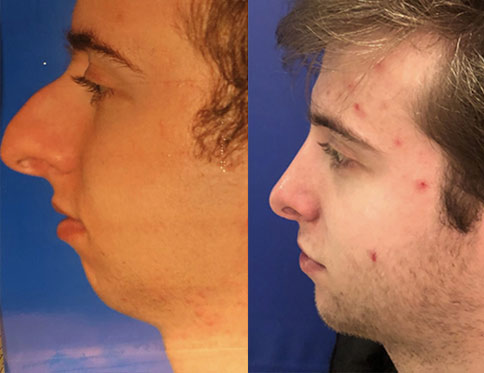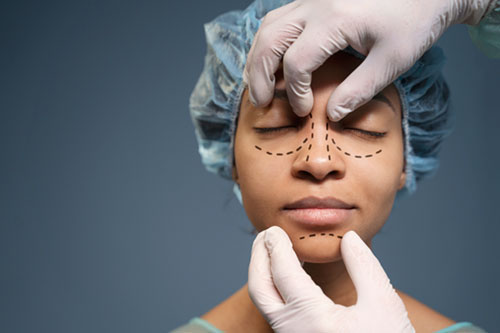Exploring the Emotional and Social Aspects That Drive People to Think About Aesthetic Surgery as a way of Renovation
The decision to go after cosmetic surgical treatment often expands beyond mere aesthetic appeals, linking with social and emotional dynamics that warrant comprehensive examination. Aspects such as self-confidence, prevalent societal beauty criteria, and the pervasive impact of social media merge to shape specific inspirations for surgical improvement. As these influences come to be increasingly popular, comprehending the underlying emotional and cultural contexts is vital. What continues to be to be explored is the profound impact these variables have not just on individuality however also on wider social norms and worths surrounding charm and acceptance.
The Duty of Self-worth
Self-confidence dramatically affects a person's decision to seek plastic surgery. People with reduced self-confidence frequently perceive themselves in a negative light, causing sensations of inadequacy regarding their physical appearance. This adverse self-perception can drive them to seek medical interventions as an approach of improving their self-image. The desire for enhancement in one's appearance is frequently linked to a belief that such modifications will certainly boost their overall self-respect and confidence.

Eventually, the duty of self-worth in the decision-making process relating to plastic surgery highlights the complex interaction in between body picture, personal contentment, and psychological health. Recognizing this relationship is essential for health care experts to guarantee that individuals are making educated choices rooted in realistic assumptions and psychological health.
Societal Elegance Standards
Influenced by prevalent media portrayals and social narratives, social appeal requirements play a critical duty in forming people' perceptions of their own bodies. These standards are usually defined by an idyllic type of beauty that highlights traits such as youthful vigor, slimness, and balance. As these perfects are continued via different networks, consisting of marketing, tv, and movie, people often internalize these messages, resulting in dissatisfaction with their natural look.
The implications of these societal norms extend beyond aesthetic preferences; they can impact self-esteem, psychological health and wellness, and interpersonal relationships. Individuals who regard themselves as falling brief of these criteria may experience sensations of inadequacy, prompting a need for cosmetic surgery as a way of attaining societal approval. This pursuit is usually sustained by the belief that conforming to these ideals will certainly boost not only physical look but also social standing and individual satisfaction.

Influence of Social Media Site
The effect of societal appeal requirements is further amplified by the surge of social media sites platforms, where curated pictures and idyllic representations of charm are ubiquitous. Users are frequently exposed to filteringed system and edited photographs, which frequently portray unattainable physical features. This exposure grows a culture of comparison, leading people to assess their very own look versus these usually impractical benchmarks.
Social network influencers and celebrities regularly advertise cosmetic treatments, normalizing the notion that medical improvements are browse around this web-site a feasible methods for accomplishing societal perfects (plastic surgery rancho cucamonga). The presence of these improvements can produce an assumption that undertaking plastic surgery is a common technique, thus influencing people to think about similar interventions as a pathway to enhanced self-esteem and social acceptance
In addition, the interactive nature of social media sites permits instant comments via likes and remarks, further strengthening the wish to satisfy popular appeal standards. Such interactions can worsen feelings of inadequacy and drive individuals towards plastic surgery as a way of acquiring recognition. Eventually, social networks plays a crucial duty fit perceptions of beauty, which considerably affects the decision-making procedures surrounding plastic surgery.
:max_bytes(150000):strip_icc()/GettyImages-155388326-5b5dfd5f46e0fb00824b134a.jpg)
Cultural Viewpoints on Appearance
Across different societies, understandings of look are deeply rooted in historical, social, and financial contexts, shaping people' sights on appeal and charm. In numerous cultures, appearance acts as a substantial pen of identity, affecting social condition, professional opportunities, and individual relationships. As an example, in some societies, light skin is frequently connected with riches and opportunity, while others may glorify darker complexion as signs of toughness and credibility.
Moreover, standard appeal criteria are typically continued with cultural stories, media depictions, and family members affects, resulting in varying ideals across various regions (plastic surgery rancho cucamonga). In Western cultures, the focus on young people and physical conditioning frequently drives individuals toward cosmetic enhancement, while in certain Eastern societies, even more refined modifications straightened with traditional aesthetics might be liked
Globalization and the spreading of electronic media have further complicated these dynamics, developing a hybridization of beauty suitables that goes beyond geographical borders. As individuals progressively browse these cultural narratives, the stress to satisfy details look standards can result in the wish for cosmetic surgery, mirroring a complex interplay of cultural worths and individual aspirations. Recognizing these cultural point of views is essential in attending to the inspirations behind cosmetic surgery factors to consider.
Mental Impacts of Aesthetic Surgical Procedure
Several individuals seeking plastic surgery record experiencing profound emotional influences that can considerably change their self-perception and emotional well-being - plastic surgery rancho cucamonga. The need for physical enhancement view publisher site usually originates from underlying problems such as low self-esteem, body dysmorphic condition, or societal pressures relating to elegance standards. For some, the immediate post-operative stage can result in a short-lived increase in positive self-image and complete satisfaction with their look, cultivating a feeling of empowerment
However, these favorable feelings might not be withstanding. Research study shows that while some individuals experience improved self-worth, others may encounter increased anxiety or clinical depression if their expectations are not fulfilled. This inconsistency can develop from unrealistic ideals bolstered by media depiction and social stories surrounding charm.
Additionally, the mental ramifications of cosmetic surgery extend beyond the individual. Relationships with household and good friends may be strained as social characteristics shift, causing sensations of isolation or alienation. Eventually, the emotional impacts of plastic surgery are complicated and multifaceted, requiring cautious consideration by both possible clients and healthcare companies to make certain enlightened decision-making and practical assumptions.
Conclusion
To conclude, the choice to pursue cosmetic surgery is dramatically affected by a combination of self-worth concerns, social appeal criteria, and cultural perspectives on appearance. The pervasive reach of social networks better intensifies these pressures, promoting impractical perfects that people frequently aim to acquire. Understanding these social and mental aspects is important for addressing the inspirations behind cosmetic surgical procedure, highlighting the requirement for a much more nuanced discussion surrounding appeal and self-acceptance in modern society.
The choice to pursue cosmetic surgery typically expands past simple aesthetics, linking with emotional and social characteristics that merit detailed exam. Eventually, social media plays an essential function in shaping assumptions of appeal, which substantially affects see here the decision-making processes bordering cosmetic surgical treatment.
As people progressively browse these cultural stories, the stress to conform to specific look requirements can lead to the desire for cosmetic surgery, mirroring a complicated interplay of personal aspirations and social values.In final thought, the choice to pursue cosmetic surgical procedure is significantly influenced by a combination of self-esteem problems, social charm criteria, and cultural perspectives on appearance. Recognizing these social and mental factors is essential for dealing with the motivations behind cosmetic surgery, highlighting the requirement for a much more nuanced discussion bordering beauty and self-acceptance in contemporary culture.